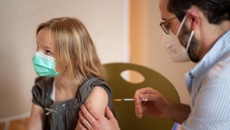
There are 4790 new cases of Covid-19 in the community today. The seven-day rolling average of community case numbers today is 5608 – last Saturday, it was 7405.
It comes as experts warn Covid-19 has joined forces with colds and flu to disrupt workforces across the country this winter.
There are 648 people in hospital.
More than 1600 people in New Zealand have died with Covid-19 as the underlying cause, or as a contributing factor, since the pandemic began.
Almost 1.6 million people have recovered from the virus, almost all after contracting the super-contagious Omicron variants during two major waves this year, with the winter wave now easing.
But our chilliest months have also seen colds and flu smash through schools and workplaces, with week-long absences due to sickness becoming the norm this winter.
Workplaces have been stretched, among them Auckland's SkyCity, where there's been a 75 per cent increase in staff sicknesses compared to 2019.
SkyCity has been staggering opening times and cutting operating hours at some venues due to staff shortages, chief of people and culture Claire Walker told Radio NZ.
"Obviously it's challenging but we do need to encourage employees who are sick not to come to work."
The Rees Hotel and Luxury Apartments in Queenstown has had about 15 per cent of its housekeepers off over winter, chief executive Mark Rose said.
The hotel got through Covid-19 only for a throng of staff to be struck down with influenza, he said.
"Most of our team had Covid about a month ago but since then the influenza has been ripping through the place. The front office at one stage, every second person was off with the flu ... and it's a really bad one.
"People are off for multiple days."
Management had rolled up their sleeves to take on other duties.
"I worked a 78-hour week, I did 10 shifts of washing dishes, and I was doing housekeeping and driving the shuttle. All of our management have been dropping everything they're doing, stripping rooms, just whatever it takes."
For the quarter ending June, about 55,000 people had cited illness as the reason for being off work for a week, about double the number seen last year, according to Stats NZ.
In the same quarter, about 60,000 were away or working fewer hours due to holidays.
More people were working less, Stats NZ insights and populations general manager Sean Broughton told RNZ.
"We had over 90,000 people who were at their main job but were working reduced hours due to sickness ... that's up 40 per cent annually."
Navigating Covid-19 cases along with winter illnesses was likely to continue over the coming weeks, a Health New Zealand spokesperson said.
"For the first time, New Zealand is currently managing a high prevalence of Covid-19 cases alongside the annual influenza season, as well as an increase in other winter illnesses.
"We have seen some encouraging signs in Covid-19 numbers in recent weeks, but … case numbers continue to be high and because of the combined winter pressures, our health system needs all the support it can get."
Although the latest outbreak had peaked, there were likely to be thousands of new Omicron cases every day for the foreseeable future, infectious diseases modeller Dr David Welch said yesterday.
Unlike the eradication of the earlier Covid-19 variants in 2020 and 2021, Omicron would stay in the community until it was superseded by a new strain, said Welch, a computer science senior lecturer at Auckland University.
That meant it would probably fall to around 3000 new cases a day until the next wave arrived, he said.
Take your Radio, Podcasts and Music with you









